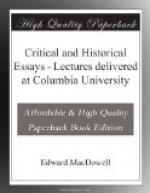This was the state of things when Gregory became Pope in 590 A.D. His additions to the modes already in use have been explained. His great reform lay in severing the connection between the music of the church and that of the pagan world before it. Casting aside the declamation and rhythm, which up to now had always dominated pure sound, he abolished the style of church singing in vogue, and substituted for it a system of chanting in which every tie between the words and music was severed.
The music was certainly primitive enough, for it consisted merely of a rising and falling of the voice for the space of many notes on one single syllable, as, for instance,
[F: (f g f g a a) a (a
a a g a g g f a)]
[W: Gloria]
The difference between this and the Ambrosian chant is evident if we look at the following; and we must also bear in mind that the Ambrosian chants were very simple in comparison with the florid tours de force of the Byzantine church:
[F: d (d f) (d e) f | (g f) (g a) a | (a g) a c’ d’] [W: Al me pater | Ambrosi, | nostras, preces,] [F: (a b) a | a g a f e d] [W: audi | Christe, exaudinos]
Now this reform could not be carried out at once; it was only through the medium of Charlemagne (742-814 A.D.), a hundred years later, that the Gregorian chant was firmly established. Authorized by a synod of bishops, called together from all parts of Europe by Pope Adrian I, Charlemagne, in 774, caused all the chant and hymn books of the Ambrosian system throughout Italy to be burned. So completely was this accomplished that only one Ambrosian missal was found (by St. Eugenius at Milan), and from this work alone can we form any idea as to the character of the music used by the followers of Ambrose, who were much retarded by the lack of a musical notation, which was the next factor needed to bring music to an equality with the other arts.
[07] Imitating the sound of the thing signified.
Poe’s
“Raven”
has much of this character.
[08] [over-dot]c, perfect pause; c[mid-dot], short;
c., shortest;
breathings: [reverse-apostrophe]
hard; ’ soft.
VIII
FORMATION OF THE SCALE—NOTATION
In comparing the Ambrosian chant with that of Gregory, it may be said that we have touched upon the vital principle of modern music. The novelty in the Gregorian chant consisted in its absolute emancipation from the tyranny of actual words and declamation; while the idea, the poetic principle, or religious ecstasy still remained the ideal to be expressed in the music. Before this, as already explained, music was either a mathematical problem, a rhythm to mark the time in dancing, or a vehicle serving for the display of clever tours de force, the music of the tragedies being merely a kind of melodious declamation. To quote Goethe, “having recognized the fact, it still remains for us to see how it developed.” Let us now consider this point.




